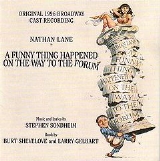
A Funny Thing Happened on the Way to the Forum
Overview
A Funny Thing Happened on the Way to the Forum is a musical
with music and lyrics by Stephen Sondheim
and book by Burt Shevelove
and Larry Gelbart
.
Inspired by the farce
s of the ancient Roman
playwright Plautus
(251–183 BC), specifically Pseudolus
, Miles Gloriosus
and Mostellaria
, the musical tells the bawdy story of a slave
named Pseudolus and his attempts to win his freedom by helping his young master woo the girl next door. The plot displays many classic elements of farce
, including puns, the slamming of doors, cases of mistaken identity
(frequently involving characters disguising themselves as one another), and satirical comments on social class.
Musical theatre
Musical theatre is a form of theatre combining songs, spoken dialogue, acting, and dance. The emotional content of the piece – humor, pathos, love, anger – as well as the story itself, is communicated through the words, music, movement and technical aspects of the entertainment as an...
with music and lyrics by Stephen Sondheim
Stephen Sondheim
Stephen Joshua Sondheim is an American composer and lyricist for stage and film. He is the winner of an Academy Award, multiple Tony Awards including the Special Tony Award for Lifetime Achievement in the Theatre, multiple Grammy Awards, a Pulitzer Prize and the Laurence Olivier Award...
and book by Burt Shevelove
Burt Shevelove
Burt Shevelove was an American musical theater playwright, lyricist, librettist, and director. Born in Newark, New Jersey, he graduated from Brown University and Yale . At Brown in 1935, he acted in the first ever Brownbrokers musical titled Something Bruin...
and Larry Gelbart
Larry Gelbart
Larry Simon Gelbart was an American television writer, playwright, screenwriter and author.-Early life:...
.
Inspired by the farce
Farce
In theatre, a farce is a comedy which aims at entertaining the audience by means of unlikely, extravagant, and improbable situations, disguise and mistaken identity, verbal humour of varying degrees of sophistication, which may include word play, and a fast-paced plot whose speed usually increases,...
s of the ancient Roman
Ancient Rome
Ancient Rome was a thriving civilization that grew on the Italian Peninsula as early as the 8th century BC. Located along the Mediterranean Sea and centered on the city of Rome, it expanded to one of the largest empires in the ancient world....
playwright Plautus
Plautus
Titus Maccius Plautus , commonly known as "Plautus", was a Roman playwright of the Old Latin period. His comedies are the earliest surviving intact works in Latin literature. He wrote Palliata comoedia, the genre devised by the innovator of Latin literature, Livius Andronicus...
(251–183 BC), specifically Pseudolus
Pseudolus
Pseudolus is a play by the ancient Roman playwright Titus Maccius Plautus. It is one of the earliest examples of Roman literature. The play begins with the shortest prologue of any of the known plays of Plautus, though it is not known whether Plautus wrote this prologue himself or if it was added...
, Miles Gloriosus
Miles Gloriosus (play)
Miles Gloriosus is a comedic play written by Titus Maccius Plautus . It is also known as "The Swaggering Soldier". His source for Miles Gloriosus was a Greek play, now lost, called Alazon or The Braggart. Although the characters in Miles Gloriosus speak Latin, they are Greeks, with Greek names,...
and Mostellaria
Mostellaria
Mostellaria is a play by the Roman author Plautus. Its name translates from Latin as [The] Little Ghost, and often appears in translations as The Haunted House. It is a comedy with a very linear plot...
, the musical tells the bawdy story of a slave
Slavery
Slavery is a system under which people are treated as property to be bought and sold, and are forced to work. Slaves can be held against their will from the time of their capture, purchase or birth, and deprived of the right to leave, to refuse to work, or to demand compensation...
named Pseudolus and his attempts to win his freedom by helping his young master woo the girl next door. The plot displays many classic elements of farce
Farce
In theatre, a farce is a comedy which aims at entertaining the audience by means of unlikely, extravagant, and improbable situations, disguise and mistaken identity, verbal humour of varying degrees of sophistication, which may include word play, and a fast-paced plot whose speed usually increases,...
, including puns, the slamming of doors, cases of mistaken identity
Mistaken identity
Mistaken identity is a defense in criminal law which claims the actual innocence of the criminal defendant, and attempts to undermine evidence of guilt by asserting that any eyewitness to the crime incorrectly thought that they saw the defendant, when in fact the person seen by the witness was...
(frequently involving characters disguising themselves as one another), and satirical comments on social class.
Unanswered Questions

